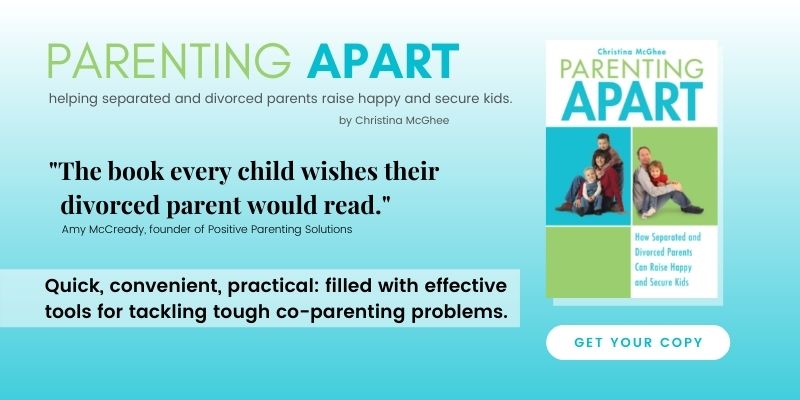I don’t want to!!! What to do when kids have a meltdown over seeing or talking to the other parent.

Your stomach starts knotting up and a sense of dread washes over you. You wonder to yourself, “How did it get to be that time again so soon?” Holding your breath, you enter the room desperately hoping that this time you can forego the whining, pleading, and fussing.
“Here we go'” you think to yourself. One last deep breath and you tell the kids it’s time to talk to (or get ready to leave with) the other parent. Before you can even finish your sentence the protesting begins. The children shift into major meltdown mode and your stress level spikes.
You’ve tried talking to your coparent about changing things but it’s clear, he/she thinks you’re the problem and isn’t going to budge. Your Ex is also quick to remind you of the court order and or parenting agreement that you are obligated to honor.
While you do have a responsibility to support your child’s relationship with the other parent, getting saddled with being the “enforcer,” isn’t a role either parent should have to take on.
If you’re tired of feeling caught between a rock and a hard place, here are a few options that may help you turn things around.
There are lots of reasons why kids may be reluctant to spend time with or talk to a parent
Have a heart to heart
There are lots of different reasons why kids may be reluctant to spend time with or talk to a parent. It could be that having to adhere to a structured schedule feels awkward or perhaps forced instead of natural.
In other situations, timing could be the culprit. If your children have other things going on, stopping to make a phone call to them may be a real pain. Instead of assuming that the other parent is the problem, consider digging a little deeper.
If you haven’t already, set aside time (preferably not right before a phone call, video chat, or pickup) to have a heart-to-heart chat with your kids. Ideally, pick a time when your children are calm and most likely to talk. Also, consider whether you’ll get more mileage out of a one-on-one conversation with each child or if a collective conversation will yield better results.
Do your best to get to the root cause of their distress. To start, you may want to say something like…
“ I know talking to Dad on Facetime isn’t easy for you and at times you may not like doing it. However, talking to Dad on a regular basis is important and we need to figure out the best way to do that. I’d like you to help me understand what we can do together to make things better.”
If they counter with a resounding, “Then don’t make us talk!” Let them know that’s not an option. Reiterate, now that things have changed, continuing to be a part of each other’s lives is something everyone needs to work on.
Don’t play the “I have to” card
While it may be true that you have a court order to follow, resist the urge to use the court as the heavy by telling kids, “I’m sorry but I have to make you go, the Judge said so.”
Yes, it may get you off the hook but in the end, all it does is set your children up for more distress.
Playing the “I have to” card just leaves them feeling helpless and out of control. It also sends children the wrong message.
Kids need to hear is that it’s important for them to have time with both of their parents.
Whether that means occasional phone calls or sharing time between households.
It’s certainly okay to let them know you realize how hard it is for things to be different. When parents split up, lots of things change for kids. Often those changes feel awkward or uncomfortable. Reassure your kids that over time, things usually get better.
Create Solutions
This is also a situation where you probably need to do more listening than talking. Let kids vent about what they don’t like. It may even help to make a list and write down what’s upsetting or uncomfortable.
After you’ve cleared the air, move on to the next step by brainstorming some ideas about how to make things better.
Review the list with them and ask for suggestions that would improve the situation.
For example…
Let’s say Jake feels weird talking to Dad on Facetime cause he doesn’t know what to say. One possible solution could be to create a “Share Board.”
So Jake has something to talk to Dad about, Mom could set up a cork board or possibly a dry erase board where Jake can make notes or post things to show Dad during their virtual chats. Jake could save things like… a note about a project he’s working on in school or a picture of him at football practice with his team.
Maybe Anna doesn’t want to spend the weekend with Mom because it’s boring and there’s nothing to do. Dad could make a plan with Anna to pick out a couple of things she’d like to take with her to Mom’s house. That way she’ll have things to play with when she’s there. It might also help if Dad gave Mom a heads up about things Anna might like to have at her house.
If your children clam up and aren’t giving you anything to work with try asking some probing questions like. “What the hardest part about talking to Dad?” “If you could change one thing about being at Mom’s house, what would it be?”
Keep in mind the benefits of engaging your kids in creating solutions are two-fold. First, it helps them feel less helpless and although it may not be any fun, it is a chance to build some important life skills. At one time or another, we all face situations or problems we can’t change.
Teach your kids that while you can’t change something that doesn’t mean you can’t learn how to deal with it.
Link it up
Psychologically it’s usually much easier to manage something that feels uncomfortable or stressful if we link it up with something that feels enjoyable.
For example, while you know exercising is something you need to do, it may not be something you feel very motivated to do. Yet, when you choose to exercise every day with a friend, how you feel about exercising often shifts. Kids aren’t any different.
If your children are struggling with court-ordered transitions (whether it’s a scheduled call or time with a parent) consider how you can pair it up with something that helps them shift gears.
Maybe your kids are really tired after school which makes talking on the phone to your Ex a real challenge for them. Before the scheduled call, you could sit with them and talk about their day while they had a light snack. That way they’re less likely to be grumpy or overly tired. Plus, things to talk about will be fresh on their mind.
For other situations, you may want to think about engaging kids in a low-key activity ( i.e. such as playing cards, coloring, or reading a book) as a way to transition them into a pickup or chat. Just make sure the activity is something they can easily break away from when the other parent shows up.
Realize it won’t get better overnight
If things don’t go smoothly right out of the gate, don’t give up. Kids need time to adjust. Remember, changing an established reaction or pattern takes time. When you hit a bump in the road, re-evaluate and think about where you may need to tweak things. Also, be sure to process the situation with your children and see if they have any ideas to offer.
More importantly, make sure you are sending a clear message that you value and support your children’s relationship with their other parent. If they sense you’re not okay with the arrangements, chances are they won’t be either.
Give it another shot
If you’ve tried to improve the situation on your end and it’s not getting any better, consider having another chat with the other parent. I know, I know, you’ve been down this road before. However, for your kid’s sake, seriously think about giving it another shot.
Whether by email, phone call, or face-to-face, let your Ex know that you want to be supportive of his/her relationship with the children. Although the children’s reaction may not reflect it, reassure them you’re doing your best.
Use the meeting to talk about what’s hard for the kids and ways each of you could make it easier for them. It may also be beneficial to remind your Ex that dragging the kids kicking and screaming to the door or the phone isn’t helping either one of you.
If communication is strained or the topic hits a raw nerve for either one of you, it may help to find a local mediator (or another neutral third-party) who can work with the two of you on finding middle ground.
For more extreme situations, you may need to consider finding a good therapist for your children who can help them verbalize their feelings. Or you may need to think about discussing the problem with a family lawyer and explore possibilities.
Keep in mind that engaging in litigation should always be a last resort, not a first option. Before going back to court, think long and hard about reasonable alternatives you can try that might alleviate the stress your children are experiencing while preserving their connection to the other parent.
Have you ever had to deal with “I don’t want to!” or “Please don’t make me” How did you get through it? If you have any sanity-saving tips to share with other parents, please share your wisdom by leaving a comment below.
View more information about Christina’s book.





